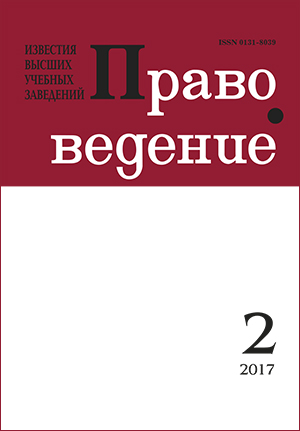Anthropological approach in the legal science: basic problems and attempts to solve them (review of article by S. A. Kalinin «Concerning consistent patterns of genesis and development of the anthropological and legal knowledge»)
Abstract
The paper is a review of an article by S. А. Кalinin “Concerning consistent patterns of genesis and development of the anthropological and legal knowledge” published in this issue of the journal “Jurisprudence”. According to the author of the article, the anthropological approach in the science of law is one of the most typical manifestations of the so-called “post-classical” (or “post-non-classical”) paradigm of the scientific cognition widespread in the last decade of the 20th century and in the early 21st century. The post-non-classical paradigm of the scientific, including legal, cognition is characterized by a number of typical features, the most important of which is the recognition of an active role of an agent, that is a person acting to a fullest extent of his/her cognitive and practical abilities in designing different types of reality, including the legal reality. The above circumstance turns the anthropological approach into an ideological, as well as theoretical and methodological foundation of sciences of law. At the same time, the author objects to the attempts to fill the anthropology with the religious and other epistemologically irrelevant content which have recently become popular. The review gives a detailed justification of the author’s position which can serve to further deepening of the studies of the human dimension of the law which are relevant to the post-classical science of law.
Keywords:
post-non-classical knowledge, complex self-developing system, radical constructivism, law, legal reality, anthropological approach
Downloads
References
Downloads
Published
How to Cite
Issue
Section
License
Articles of "Pravovedenie" are open access distributed under the terms of the License Agreement with Saint Petersburg State University, which permits to the authors unrestricted distribution and self-archiving free of charge.




